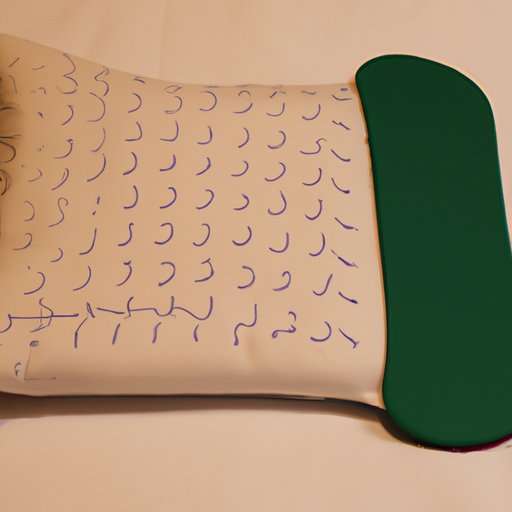Introduction
Using a heating pad while sleeping can provide comforting warmth and relaxation that many people enjoy. However, it’s important to understand the benefits and risks associated with this practice in order to keep you safe and comfortable. This article will explore the advantages and disadvantages of sleeping with a heating pad, how to choose the right one for your needs, and tips for safely using a heating pad at night.
Overview of Benefits and Risks of Sleeping with a Heating Pad
Sleep is essential for our physical health and mental wellbeing. A heating pad can help promote a deeper, more restful sleep. Heat therapy is known to reduce muscle tension, improve circulation, and alleviate pain. Additionally, the warmth of a heating pad can make it easier to fall asleep and stay asleep.
However, it’s important to be mindful of the potential risks associated with sleeping with a heating pad. Overheating may cause skin irritation or burns, and some individuals have an increased sensitivity to heat. It’s also possible that the heat from a heating pad could interfere with the body’s natural cooling process, which can lead to dehydration and other issues.
How to Choose the Right Heating Pad for Bedtime Comfort
When selecting a heating pad for bedtime comfort, there are several factors to consider. First, you need to think about size. If you plan on using the heating pad on multiple parts of your body, then you’ll want a larger pad. If you’re only using the pad on one area, such as your neck or back, then a smaller pad might be sufficient.
It’s also important to check the heat settings on the heating pad. Most pads offer multiple heat levels, so you can choose the temperature that best suits your needs. Look for a pad that has an automatic shut-off feature, so you don’t have to worry about leaving it on all night.
Finally, look for a heating pad that is made of a soft material, like fleece or flannel, so it’s comfortable to sleep on. Make sure the pad is free of any tears or defects, as this can be dangerous. Also, avoid buying used pads, as they may not be as safe.

Tips to Safely Use a Heating Pad While You Sleep
When using a heating pad for sleep, it’s important to do so safely. Here are some tips to keep in mind:
- Don’t Sleep with the Heating Pad on High Heat: High temperatures can cause skin irritation or burns, so it’s best to keep the heat setting low.
- Place the Heating Pad Securely Underneath Your Body: Make sure the heating pad is securely tucked underneath your body, so it won’t move around during the night.
- Avoid Overheating or Burning Yourself: Don’t leave the heating pad on for too long, as this can lead to overheating or burning yourself.

What to Consider Before Using a Heating Pad in Bed
Before using a heating pad in bed, it’s important to talk to your doctor. They can determine if the heat from a heating pad is safe for you to use. It’s also a good idea to discuss the use of a heating pad with your partner, as some people find the heat uncomfortable.

Alternatives to Sleeping with a Heating Pad
If you’re looking for an alternative to sleeping with a heating pad, there are several options available. Hot water bottles are an effective way to provide warmth without the risk of electric shock or fire. Electric blankets are another option, but these should never be left on overnight. Weighted blankets are also a popular choice for providing warmth and comfort at night.
Exploring the Effects of Heat Therapy on Sleep Quality
Heat therapy has been shown to have positive effects on sleep quality. Studies have found that heat therapy can improve sleep duration and reduce wakefulness. Heat therapy may also reduce stress and muscle aches, which can make it easier to relax and fall asleep.
Conclusion
Sleeping with a heating pad can provide comfort and relaxation, but it’s important to understand the benefits and risks associated with this practice. Be sure to choose the right size and heat setting for your needs and follow safety guidelines when using a heating pad at night. Talk to your doctor before using a heating pad in bed, and consider alternative options like hot water bottles, electric blankets, and weighted blankets.
Overall, understanding the potential risks associated with sleeping with a heating pad can help you make an informed decision about whether this is the right choice for you. Ultimately, the goal is to find the best solution for achieving a deep, restful sleep.


